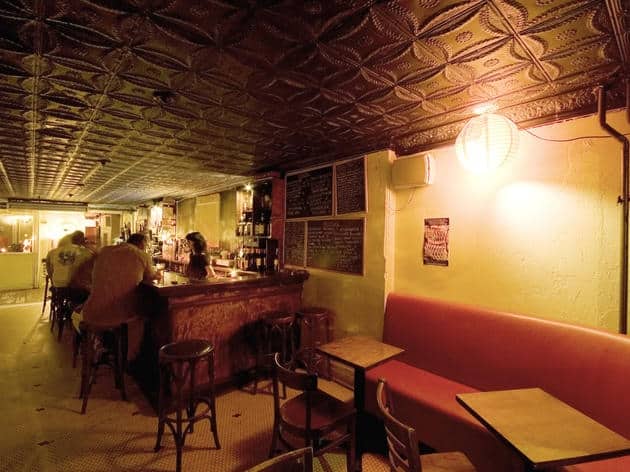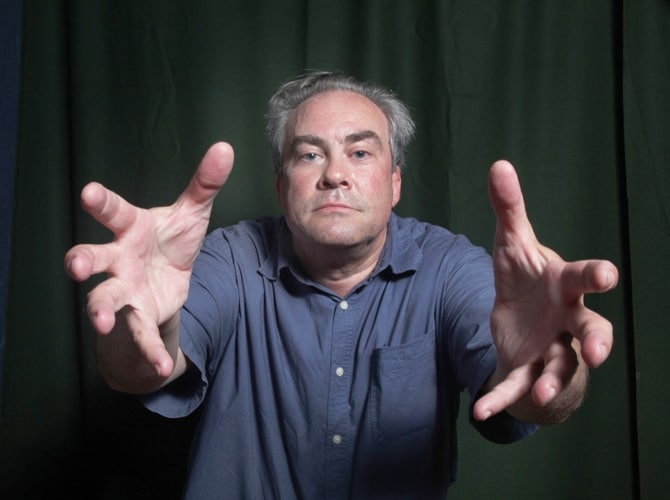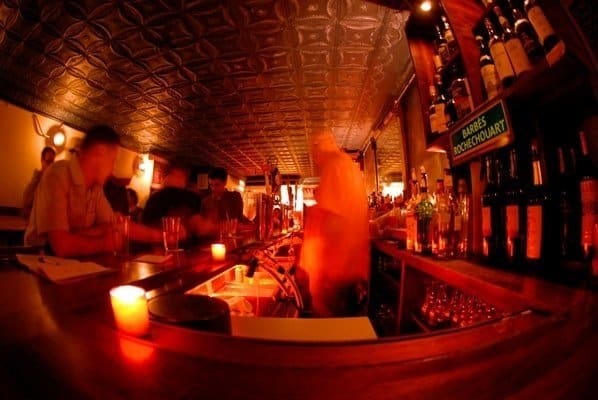
On June 12, Pamelia Stickney (formerly Kurstin) and Brian Dewan will be playing at Barbes, in Park Slope, at 8pm. This duo, collectively listed as Night Pollution, promises to give a unique performance, to say the least. Stickney is one of the world’s leading performers on the Theremin, the bizarre and otherworldly electronic instrument known for its schticky use in UFO sci-fi films. Few performers have devoted themselves to the instrument like she has, and few musicians have taken it to such musically diverse places. Besides more high-profile collaborations with David Byrne, Yoko Ono, and Bela Fleck, she is most notable for her extremely musical and inventive incorporation of the instrument into jazz, improvised music, orchestras and rock bands. Stickney presents such a unique personality and approach in her idiosyncratic way that she seems like she was brought to us from a foreign sci-fi landscape, and the Theremin is the grounding force. She plays with accuracy, confidence and clarity, something seemingly incongruous with the nature of her instrument.
 Brian Dewan, the other half of this duo, has followed an even more circuitous career path. Known equally for his off-kilter folk as his electronic music, he uses a wide range of instruments. He uses rare and unusual instruments, as well as homemade electronic instruments, but is also equally known for his visual and multimedia art. Dewan’s art has graced the covers of David Byrne, They Might Be Giants, and Neutral Milk Hotel. He creates manipulated educational film strips from the 1940s; installation art (dubbed “Shrines”); and cabinetry-encased homemade electronic instruments. Dewan is a true artist culling from the widest range of Americana. His music veers between musicology and an instrument museum, often featuring accordions, koto, homemade instruments, organs, autoharps and zithers, as well as singing and storytelling.
Brian Dewan, the other half of this duo, has followed an even more circuitous career path. Known equally for his off-kilter folk as his electronic music, he uses a wide range of instruments. He uses rare and unusual instruments, as well as homemade electronic instruments, but is also equally known for his visual and multimedia art. Dewan’s art has graced the covers of David Byrne, They Might Be Giants, and Neutral Milk Hotel. He creates manipulated educational film strips from the 1940s; installation art (dubbed “Shrines”); and cabinetry-encased homemade electronic instruments. Dewan is a true artist culling from the widest range of Americana. His music veers between musicology and an instrument museum, often featuring accordions, koto, homemade instruments, organs, autoharps and zithers, as well as singing and storytelling.
 Stickney and Dewan’s connection through an outsider Americana lens is clear, and their appearance at Barbes is a natural fit. Having just turned 17, Barbes has been indoctrinated into the “institution” category of NYC clubs. Though the neighborhood has changed significantly since it first opened, Barbes’ success has to do with its homey, musician-friendly adherence to old and steady norms. Bands begin at 8pm and 10pm, nightly, shows are almost always free, and they haven’t pushed their luck with overly expensive ticketing. Most of the same bands that helped open the club and put it on the map appear there regularly, even if they tour internationally on stages in front of 1000s. The music room is tiny, and thus fills up easily, but the overhead and maintenance of basic club expenses keep it incredibly manageable. Barbes is located at 376 9th St. (corner of 6th Ave.) in Park Slope. www.barbesbrooklyn.com
Stickney and Dewan’s connection through an outsider Americana lens is clear, and their appearance at Barbes is a natural fit. Having just turned 17, Barbes has been indoctrinated into the “institution” category of NYC clubs. Though the neighborhood has changed significantly since it first opened, Barbes’ success has to do with its homey, musician-friendly adherence to old and steady norms. Bands begin at 8pm and 10pm, nightly, shows are almost always free, and they haven’t pushed their luck with overly expensive ticketing. Most of the same bands that helped open the club and put it on the map appear there regularly, even if they tour internationally on stages in front of 1000s. The music room is tiny, and thus fills up easily, but the overhead and maintenance of basic club expenses keep it incredibly manageable. Barbes is located at 376 9th St. (corner of 6th Ave.) in Park Slope. www.barbesbrooklyn.com










One Comment
Pingback: Night Pollution at Barbes – The Red Hook Star-Revue – IAM Network